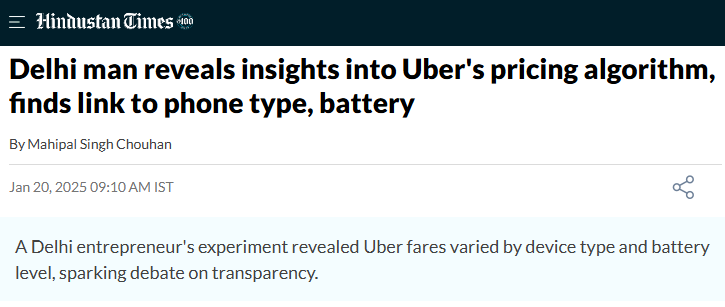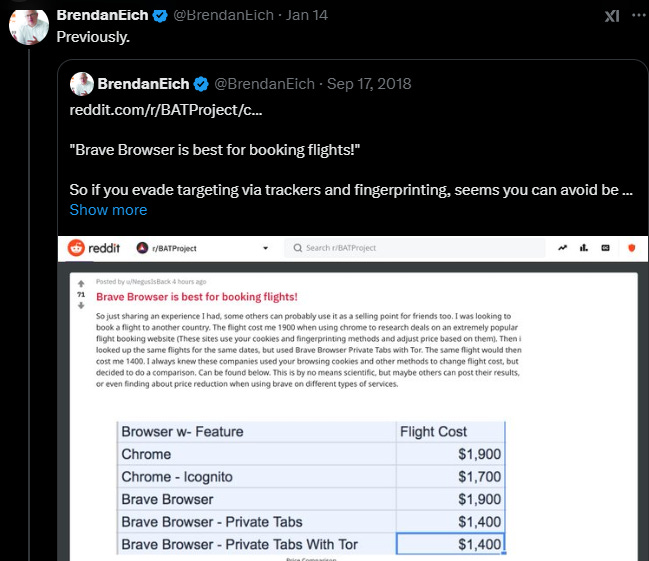Privacy Tools Can Save You Thousands
These simple moves and tools boost your privacy while helping you outsmart price discrimination
We often hear that using privacy friendly tech is ideal, but it’s expensive. Instead of relying on “free” services like Gmail (or anything Google), you have to actually pay for privacy preserving services like Proton Mail or Mullvad VPN. We heard the complaint so much we sat down and crunched the numbers. Check it out for yourself and decide on whether privacy is really too expensive.
But there’s another angle to this issue. Privacy tech can actually save you money. No joke.
How?
By combating data driven price discrimination.
Before we get into the details of the how, a quick recap of price discrimination, or price “optimization” as the industry is more likely to refer to it, is useful.
It happens this is a topic that we have personal knowledge about because in a prior gig, we worked with revenue optimization teams in the tech industry. The whole purpose of these teams is to use software and data to maximize pricing.
Price Discrimination Optimization
Price discrimination is nothing new. Businesses have routinely offered different pricing for different customers, but it’s usually based on a relatively large class. Think student discounts, senior discounts or ladies night at the local bar. For the most part, nobody complains about these price differentials. They’re generally accepted.
In the digital centric era, companies no longer have to limit their price discrimination to broad groups. They can tailor pricing at the geographic or even individual level. It’s been around for a while, though immature. See this study from all the way back in 2014.
Tech has come a long way since then. And there’s still room to grow. Advances in plentiful personal information online, improved computer processing, and AI are going to revolutionize price discrimination. It’s only a matter of time before these things are combined to provide highly customized pricing based on the device you use, your income, your zip code, your browsing history, etc.
Now, on to the examples that spurred this post.
Recent investigations have uncovered how travel sites, ride-sharing apps, and online retailers charge materially different prices to different customers based on their location, devices, and browsing habits.
Location-Based Price Discrimination
The most striking example comes from a recent San Francisco Chronicle investigation into hotel booking sites. When searching for hotels in Manhattan, San Francisco residents were quoted rates up to $500 more per night compared to users browsing from less affluent cities like Phoenix or Kansas City - for the exact same room on the same dates.
The investigation found that geography was the single biggest factor in determining hotel prices. A room at the Little Charlie Hotel in Manhattan was priced at $423 per night for San Francisco users, while Kansas City users saw $234, and Phoenix users got the best deal at just $181. Read the full report here.
Device-Based Price Discrimination
Your choice of phone or computer can also affect the prices you see. A recent controversy erupted when someone in India discovered Uber appeared to charge iPhone users more than Android users for identical rides. In this case, an Android user was quoted ₹290.79 for a ride while an iPhone user saw ₹342.47 for the exact same trip.
This isn't an isolated incident of pricing based on device used. Previous studies have found:
Orbitz steered Mac users toward more expensive hotels compared to Windows users
Travelocity showed lower prices to mobile iOS users
Home Depot offered better deals to customers using mobile browsers
Browser and Tracking-Based Price Discrimination
Even your choice of web browser and whether you're logged into an account can impact prices. Brave CEO Brendan Eich noted on X a post from Reddit from a few years back where a Redditor claimed that Brave browser offered the best pricing on airline flights.
Here are some other examples:
Hotels.com showed a $22 price difference for the same New York hotel room between regular and incognito browsing (source)
Some travel sites like Cheaptickets.com and Orbitz offered lower rates to logged-in users (source)
Capital One displayed different loan offers based on which web browser customers used (source)
How Companies Justify This Practice
Travel companies often defend these practices by claiming they offer "promotional rates" to certain segments rather than charging others more. Booking.com's spokesperson suggested that the higher prices San Franciscans see represent the "real" price, while users in other cities receive “discounts”. (source)
The reality is that companies use sophisticated algorithms to analyze your data and determine the maximum price you might be willing to pay. They collect information about your:
Location via IP address
Device type and operating system
Browser choice and settings
Previous purchase history
Browsing patterns
How to Protect Yourself and Save Money
The good news is that you can fight back against price discrimination using common privacy tools and strategies:
Use a VPN: This is the most effective method to defeat location-based pricing. By routing your traffic through servers in different cities, you can compare prices and get the best deals.
Try Private Browsing: Use your browser's incognito or private mode when shopping to prevent sites from accessing your browsing history.
Clear Cookies Regularly: Delete cookies and browsing data before making major purchases to prevent companies from tracking your search patterns.
Compare Across Devices: Check prices on different devices, browsers, and with/without being logged into accounts.
Use Email Aliases (a/k/a disposable email addresses): This makes it harder for companies to create a consumer profile that may allow them to make an assumption on how much you can spend for a product or service.
If any VPN providers are reading this, a potential differentiator for your product is a VPN that has a “deal” mode where the app selects the VPN location to maximize savings. VPN providers may even want to consider spinning up locations in lower cost areas like West Virginia, Louisiana, etc. to “optimize” the pricing in favor of the consumer.
The Bigger Picture
Price discrimination isn't new. However, the digital age has made it more sophisticated and less transparent (to put it diplomatically). Companies can now quickly adjust prices based on dozens of data points about you, often without your knowledge. While this practice is generally legal (unless based on protected characteristics like race or gender), it raises important questions about fairness and transparency in digital commerce.
The best defense remains a good offense. And the good news is that if you implement the basic privacy enhancing steps we routinely recommend, you’ll realize the pricing benefits by default. By that we mean doing things like using a VPN and a privacy friendly browser like Brave.
The key takeaway about all this is that a privacy first mindset isn’t just about principles or safety, it can also help ensure you’re getting a fair price when shopping online.
Using privacy tech to save money is a smart move. A next level move is to grab or upgrade to a paid subscription to Secrets of Privacy and get full access to our posts and content. To help you out, we’re offering a free 60 day trial. Get started here.
Looking for help with a privacy issue or privacy concern? Chances are we’ve covered it already or will soon. Be sure to follow us on X and LinkedIn for updates on this topic and other internet privacy related topics. We’re also now on Rumble and YouTube. Subscribe today to be notified when videos are published.
Disclaimer: None of the above is to be deemed legal advice of any kind. These are *opinions* written by a privacy attorney with 15+ years of working for, with and against Big Tech and Big Data. And this post is for informational purposes only and is not intended for use in furtherance of any unlawful activity.
Check out our Personal Privacy Stack here.
Proton is running a limited time promotion right now on their core offerings like Proton VPN and Proton Mail. Get privacy peace of mind for as little as $3.99 per month (affiliate link).
If you’re reading this but haven’t yet signed up, join the growing Secrets of Privacy community for free and get our newsletter delivered to your inbox by subscribing here 👇






